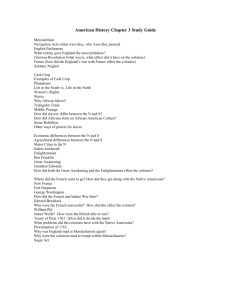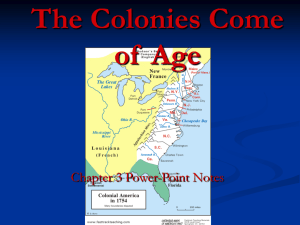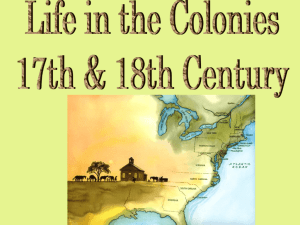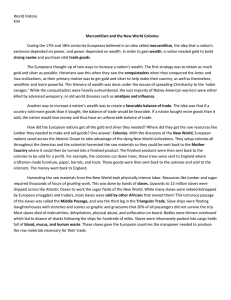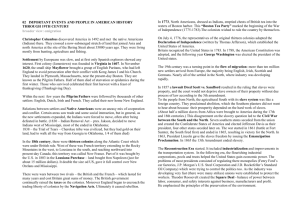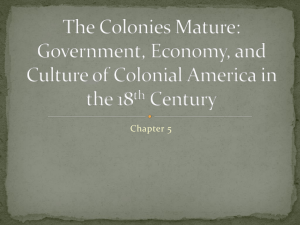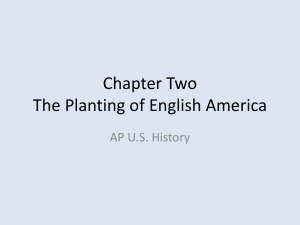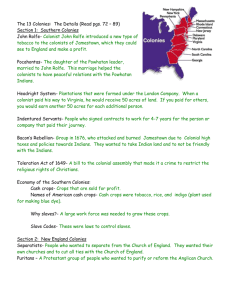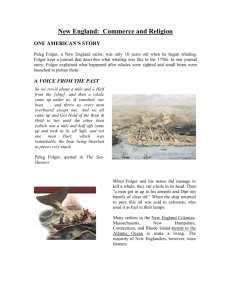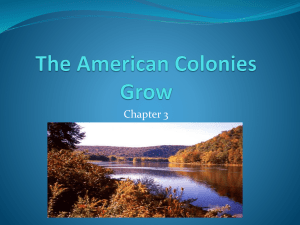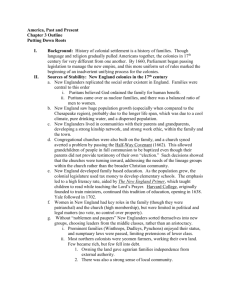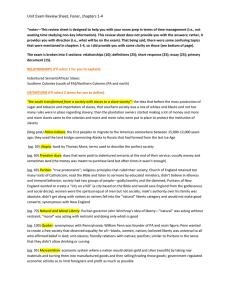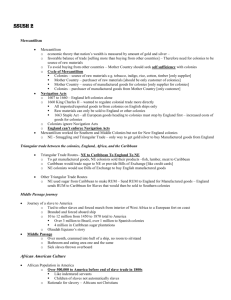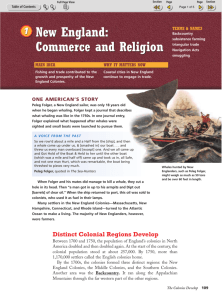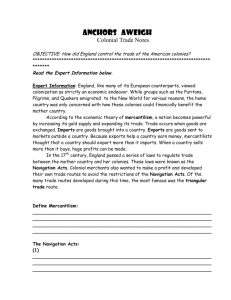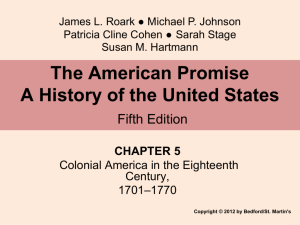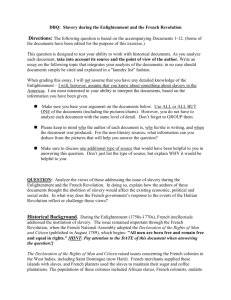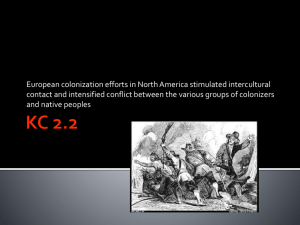Chapter 1 Section 4: The Colonies Come of Age
advertisement
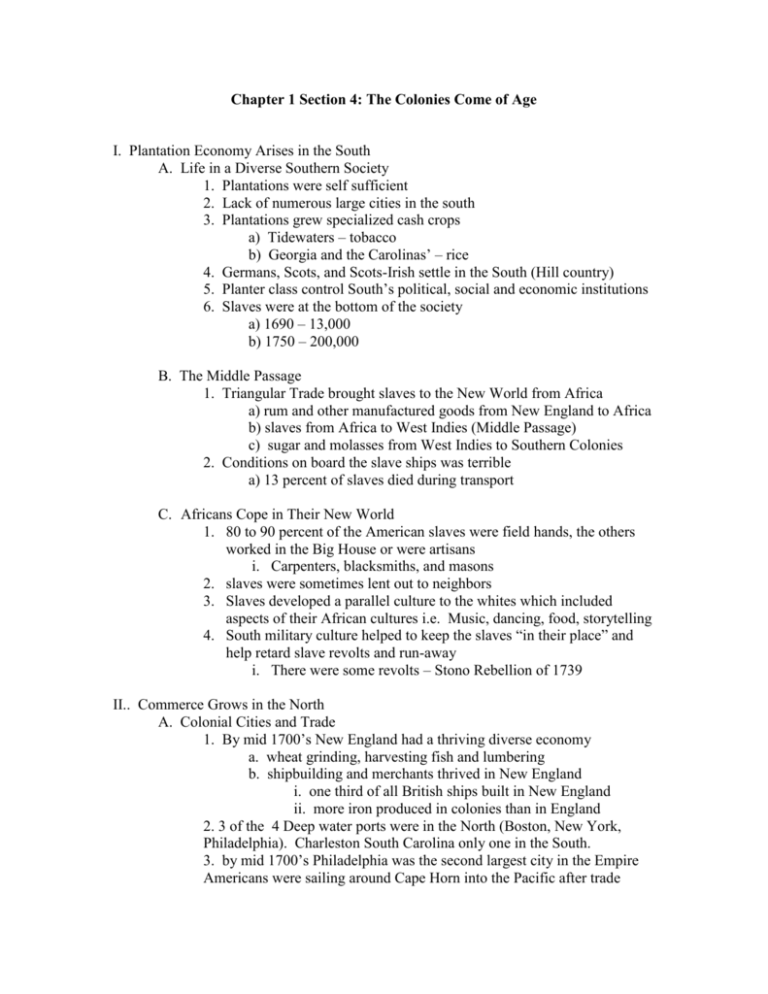
Chapter 1 Section 4: The Colonies Come of Age I. Plantation Economy Arises in the South A. Life in a Diverse Southern Society 1. Plantations were self sufficient 2. Lack of numerous large cities in the south 3. Plantations grew specialized cash crops a) Tidewaters – tobacco b) Georgia and the Carolinas’ – rice 4. Germans, Scots, and Scots-Irish settle in the South (Hill country) 5. Planter class control South’s political, social and economic institutions 6. Slaves were at the bottom of the society a) 1690 – 13,000 b) 1750 – 200,000 B. The Middle Passage 1. Triangular Trade brought slaves to the New World from Africa a) rum and other manufactured goods from New England to Africa b) slaves from Africa to West Indies (Middle Passage) c) sugar and molasses from West Indies to Southern Colonies 2. Conditions on board the slave ships was terrible a) 13 percent of slaves died during transport C. Africans Cope in Their New World 1. 80 to 90 percent of the American slaves were field hands, the others worked in the Big House or were artisans i. Carpenters, blacksmiths, and masons 2. slaves were sometimes lent out to neighbors 3. Slaves developed a parallel culture to the whites which included aspects of their African cultures i.e. Music, dancing, food, storytelling 4. South military culture helped to keep the slaves “in their place” and help retard slave revolts and run-away i. There were some revolts – Stono Rebellion of 1739 II.. Commerce Grows in the North A. Colonial Cities and Trade 1. By mid 1700’s New England had a thriving diverse economy a. wheat grinding, harvesting fish and lumbering b. shipbuilding and merchants thrived in New England i. one third of all British ships built in New England ii. more iron produced in colonies than in England 2. 3 of the 4 Deep water ports were in the North (Boston, New York, Philadelphia). Charleston South Carolina only one in the South. 3. by mid 1700’s Philadelphia was the second largest city in the Empire Americans were sailing around Cape Horn into the Pacific after trade 5. prior to 1700 most immigrants came as indentured servants from England 6. during 18th century about 463,000 Europeans migrated to America i. Germans, Scots-Irish, Dutch, Scandinavians and Jewish. 7. Farming in the North different than South i. Grew several cash crops – wheat and corn ii. Slavery not needed but did exist 1) more in Middle Colonies than in New England III. The enlightenment A. European ideas inspire the Colonists 1.The Renaissance brought about new ways at looking at life 2. Observations of nature helped develop the ideas of natural laws a) Copernicus, Galileo and Isaac Newton 1. earth not the center of the universe 2. mathematics could prove predictability in nature 3. Enlightenment stressed reason and scientific method 4. Franklin and other colonists used applied science to explain aspects in their fields 5. Books and pamphlets helped spread ideas a) high degree of literacy in colonies due to advocacy of churches fro parishioners to be able to read the bible 6. Liberal thinking regarding daily lives also brought debate about type of relationship with mother country and natural rights B. The Great Awakening 1. 1740’s and 1750’s was a revival of the spiritual fever of the Puritan faith that had been lost in favor of luxury items and Royal decrees loosening the Puritan Church power in New England. 2. Religious interest also brought debate about established denominations practices → the creation of new churches such as Baptists and Methodists 3. New colleges built to develop new ministers of the new faiths; Brown, Dartmouth, Princeton, Columbia. 4. Traveling preachers and revivals helped spread news and unite the colonies a) correspondence between new followers help keep areas informed of happenings. 5. Helped generate people to question authority of churches and government. a) stressed the individual (as did the Enlightenment) IV. French and Indian War 1. 1734 France began its New World Empire with Cartier’s exploration of St. Lawrence River. 2. Champlain founded Quebec 1608 3. La Salle → Mississippi River 1682 = Louisiana 4. New France demographic make-up much different than British Colonies i. Young single men ii. Fur traders iii. Sparsely populated outposts 5. better relationships with Native Americans B. Early French Victories Ohio River Valley (area of Pittsburg) disputed a) French built Fort Duquesne 2. British suffered numerous defeats, not used to Indian style of warfare a) colonial units did better (under Washington) 3. Great Britain changes leadership and sends new officers to lead fight 4. Achieve successes and win war 1763 5. Great Britain gets Canada and lands E. of Mississippi 6. France upset with Great Britain and looking for revenge 7. Proclamation Line of 1763 upset Colonists a) forbid colonists to cross Appalachian Mts.
